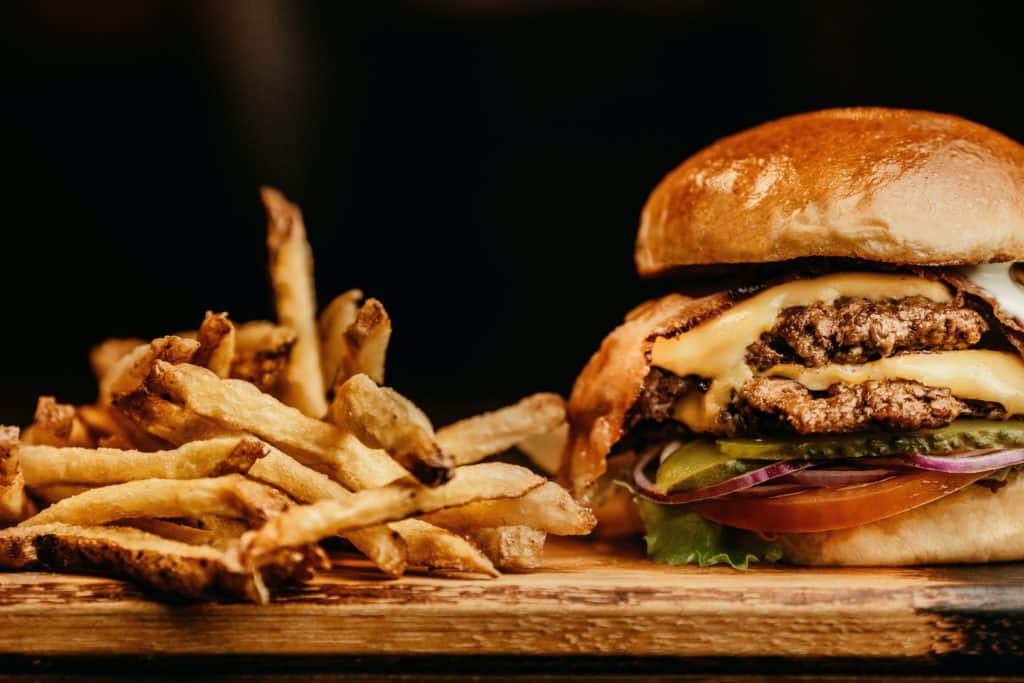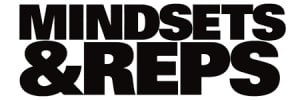
There is no greater appeal in the fitness world than the prospect of eating junk food and still effectively building muscle. With how calorie dense fast food is, coupled with the lack of micronutrients, it seems impossible.
However dieting is rarely so binary as to say something is unequivocally good or bad; or to say something can or can’t be done. Diet and nutrition is a unique combination of simplicity with endless levels of nuance.
Fast food restaurants have enough diversity in their menu items that you can build muscle eating it. Your body type (ectomorph, endomorph, mesomorph) will determine the extent to which you can push calorie intake.
Most fast food places nowadays will have options like grilled chicken, salads, burgers without the bun, and chili, which can fit into almost any balanced diet plan.
But when people consider the idea of building muscle while eating fast food, they envision the more fun options like cheeseburgers, fried chicken, French fries, and cookies.
Setting and hitting proper macronutrient targets will be the main driver of muscle growth from a nutrition perspective. Online nutrition calculators can help someone find their macros, but bear in mind that these aren’t perfect and some trial and error will be involved.
Building muscle consistently requires, at the very least, eating in a slight calorie surplus. The exceptions to this rule would be beginners new to lifting, people on performance enhancing substances, or potentially obese individuals due to the surplus of energy reserves they have in the form of body fat.
With that said, a calorie surplus allows an individual more freedom to fit junk food into their diet. Some people have very adaptive metabolisms, meaning their metabolism adjusts very quickly to the surplus. Over time this allows them to eat more and more.
With respect to building muscle, eating fast food is a balancing act between calorie density, maintaining macronutrient ratios, controlling overeating and stabilizing hunger levels.
Eating fast food while building muscle doesn’t have to be confined to a dirty bulk dieting program. With the right attention to detail, you can enjoy fast food without gaining too much excess body fat.
Does Junk Food Prevent Muscle Growth
Naysayers to the flexible dieting, or if it fits your macros, crowd will often bring up the idea of food quality. In other words, it’s not just about macronutrients but also the type of food and the vitamins and minerals it contains.
No one will argue the importance of having minimally processed, nutrient dense, whole foods in the diet. But at a certain point you will have a hard time hitting macros, especially eating in a large calorie surplus, with just meat, vegetables, and starches.
When it comes to food quality, the most important thing to consider is protein. When you look at the protein recommendations for muscle growth, which is around one gram per pound of lean body mass, it is under the assumption that the protein meets a certain standard.
Protein recommendations for building muscle are under the assumption that at least half the protein comes from bioavailable, complete sources that contain all nine essential amino acids.
But when you consider the typical fast food meals, this really isn’t an issue. Chicken nuggets and chicken wings are still chicken, and a Big Mac is still ground beef. While these foods may contain preservatives and be fattier than typical lean meats, they are still complete proteins and satisfy the protein requirements needed to build muscle.

Some people will argue that most carbohydrates should come in the form of glucose, as glucose is more favorable for muscle storage. Thus, they argue people should avoid sugar.
But it’s important to remember that table sugar is half glucose and half fructose. In fact, even high fructose corn syrup is only 55% fructose and 45% glucose. So it is not as if there is a large bolus of fructose coming into the diet.
Fructose does serve a purpose, as it is the primary form of carbohydrate stored in the liver. Similar to muscle, liver glycogen can be used for energy in times of need, like long workouts. The liver can store about 100 grams of carbohydrates.
It’s important to remember that some of the health claims about fructose are with regard to its rampant consumption overall. Anyone looking to build muscle in the gym takes their diet more seriously than the average person. Their calories are controlled and macronutrients will be tracked.
Still, the point that carbohydrates should come in the form of glucose more than fructose is well taken. However, this is not that hard to achieve even when consuming fast food. Similar to the discussion about food choices and protein quality, many of the carbohydrates in typical fast food meals are glucose based.
French fries, which are just potatoes at its core, are nearly 100% glucose. The same goes for hamburger buns, dinner rolls, and other types of bread.
If you want to take extra care to limit fructose consumption, just minimize consumption of desserts and sodas. But again, they can still be in the diet so long as the calories and macronutrients are accounted for.
While certain fast foods and junk foods are more adept for building muscle, there is no mechanism which shows that they would prevent muscle gain in any manner.
We also have to look at this from a reasonable perspective. We’re addressing the concept of eating junk food and building muscle. It’s not as if every single meal is McDonalds, Burger King, and Dunkin Donuts. From a calorie and macro counting perspective, it would be hard to eat every meal from a fast food joint even on a massive bulking diet.
Best Junk Foods For Building Muscle
Choosing junk food for muscle building purposes comes down to strategy. From a nutrition perspective, it’s important to understand what makes junk food “junk.”
Junk food and fast food is extremely palatable, meaning you can eat a lot of it without getting too full. These foods are usually processed and devoid of nutrients like protein and fiber.
Highly palatable foods usually have a combination of fats and carbohydrates. Most people see the sugar content of junk food and demonize sugar because of it, but when you dig into the nutrition data you will often find that a high percentage of calories come from fat as well.
When you look at the nutrition content of whole foods, it’s very rare to find anything that is high in both carbohydrates and fat. It is usually one or the other.
For example, an apple has about 25 grams of carbohydrates and 0 grams of fat. Olive Oil has 13 grams of fat and 0 grams of carbohydrates.
A steak may be high in protein and fat, depending on the cut of meat. Eggs are high in protein and fat as well. But you will be hard pressed to find any food in nature that is high in carbs and fats.
This combination is part of the reason why it’s so palatable. From an evolutionary perspective, we’re simply not used to these nutrients in combination.
Could you fit some McFlurries or Krispy Kreme Doughnuts into a muscle building diet? Absolutely, but the rest of the day may be tough, as you will have to make up for the lack of protein and fiber in those foods. The better option may be to go for something more balanced.
Desserts will be the toughest to fit into the diet, since they have virtually no quality protein in them. But foods like chicken nuggets, cheeseburgers, and even pizza are more adept for building muscle.
Making your own modifications can streamline the dieting process as well. For example, you could grab 2 Big Macs from McDonalds but make your own fries in the oven or air fryer. This will significantly lower the fat content of the fries since they can be cooked without deep frying them.
Many of the modifications are even simpler, like removing or swapping out condiments. I’ve gotten Chinese food platters with sauce on the side. It’s there if I want it, and I’ll have some, but now my general tso’s chicken isn’t swimming in it.
If you do want the cookies or donuts, have them with a protein shake instead of coffee to make up for the lack of protein in the foods themselves.
You can have your cake and eat it too, while still adhering to the macros and diet plan overall. It’s just important not to fall into the trap of trying to fit junk food in at every waking moment. It is these types of eating habits that give flexible dieting a bad reputation.
Recent Posts
Bulking is a dieting phase where an individual increases their calorie consumption in an attempt to gain weight, ideally in the form of lean muscle tissue. A proper bulking phase revolves around a...
Many lifters use the term bulking as an excuse to eat whatever they want. Typically this occurs during the holidays when junk food is at a premium, so the timing is very convenient. And this is fine;...
